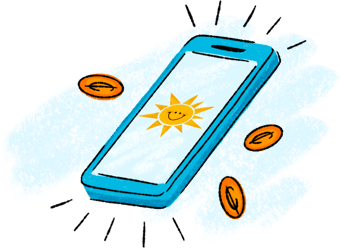Impulse buying affects people of all ages and from all walks of life. We've all been there. You're scrolling through your social media feeds or emails, and you see an advertisement for shoes that are 50% off. You think to yourself, "I don't need new shoes, but these are such a great deal!" And before you know it, you've clicked on the link, added the shoes to your cart, and entered your credit card information.
Impulse buying can lead to buyer's remorse and become a strain on finances over time. If you fall into the impulse buying trap, don't worry - you're not alone.
Learn more about what impulse buying means, why it’s important to address it, and dive into some of the ways in which you can help reduce those habits.
What Is Impulse Buying?
Impulse buying is "the unplanned purchase of a good or service." When we impulsively buy something, we often do so without considering whether we can actually afford it. Impulse buying can be triggered by various things, including emotions, advertisements, peer pressure, and even fatigue. In fact, according to a study conducted by the National Retail Federation, nearly 60% of Americans have admitted to impulse buying at one point or another.
While there's nothing wrong with treating yourself occasionally, it’s important not to bend your budget too much and too frequently. When you start spending more than you had originally planned to, you may start extending your way of spending into using things like credit cards. Credit card companies are no strangers to making money off the interest of those poor habits, so be careful and intentional with your spending.
Why You Should Reduce Impulse Buying
There are a few key reasons why you should reduce impulse buying. First, as mentioned earlier, impulse buying can strain your finances. This is because when you impulsively buy something, you're typically spending money you hadn't planned to. This can lead to credit card debt or, if you're not careful, even put you into a financial hole.
Second, impulse buying can also cause feelings of guilt and regret. This is because you may buy something you don't really need or want. You may also end up spending more money than you intended to. These feelings can leave you stressed and even lead to anxiety and depression.
Psychiatrists have found that impulse buying can be a sign of a bigger issue, such as a compulsive buying disorder. This is characterized by an uncontrollable urge to buy things, even if you can't afford them.
What are the 10 Ways to help Reduce Impulse Buying
Sales and marketers use various techniques to get us to buy their products impulsively. They understand our triggers and know how to push our buttons. But we can make a conscious effort to help reduce impulse buying for ourselves. All you need is a little discipline and time to plan out your finances.
Here are ten ways to help create better spending habits:
1. Consider the Opportunity Cost
Economists define opportunity cost as "the value of the best alternative forgone, in terms of lost opportunity." In other words, it's what you're giving up by making a particular purchase. For example, let's say you have $100 to spend and you're considering buying a new pair of shoes that are on sale for $50. The opportunity cost is what you lose out on by purchasing the $50 shoes. That may be $50 towards your rent that month or $50 to take that special someone out on a date.
When considering a purchase, always think about all the options available to you at that moment that could be taken away with that money spent. If it's not worth losing out on the opportunity, then try to avoid making the purchase.
2. Create a Budget and Stick to It
Planning your finances puts you in a better position to account for your income and expenses. This will help you avoid overspending and getting into debt for something that is of less importance. Making commitments by sticking to a budget will help train your mind to think before spending.
One way to create a budget is by using the envelope system, which you can find in apps like GoodBudget and more. With this system, you would allocate a certain amount for each spending category, such as groceries, transportation, and entertainment. Once the allocated funds for a particular category are gone, you can't spend any more money in that category. This system helps curb your spending and avoid impulse buying.
There are many variations of budgeting systems and applications that may work better for your lifestyle. Find what works for you and begin your journey of practicing good budgeting habits.
3. Unsubscribe from Unwanted Marketing Emails
In every inbox, there's always that one company that sends promotional material regularly, trying to get you to buy their latest product. That is what leads many people to fall into the trap of impulse buying. Unsubscribing from marketing emails from companies you have a tendency to spend impulsively on can help reduce the temptations of buying something you don't need. For companies you didn’t opt in to receive marketing emails from, make sure to mark those as spam and filter them into your junk folder to avoid your wandering eye for the “excellent deal”. Less advertising may keep you in the driver seat to avoid that frivolous purchase!
4. Make Use of a Shopping List
Before heading out to the store, always take some time to make a shopping list of the items you need. Identify items that are essential and non-essential items. This will help you avoid buying things that you don't need. Once you're at the store, stick to your list and resist the temptation to buy something that's not on it.
5. Wait for at least 24 hours Before Making That Big Purchase
There are so many regrets that come with impulse buying, especially if the purchase is big. According to researchers, it takes an average of 23 minutes and 15 seconds to feel regret after making an impulse purchase. To avoid this feeling of regret, always wait for at least 24 hours and reevaluate how you feel about that decision. This will give you time to consider the purchase and whether you actually need it.
6. Read Through Online Reviews
If you're thinking about buying something online, always take some time to read through reviews first. Customer reviews can give valuable insights into a product's quality, durability, and features. This information can help you make an informed decision and avoid impulse buying.
7. Avoid Purchasing Triggers
Certain triggers can cause us to impulse buy. For some people, it might be seeing a sale sign. For others, it might be receiving a coupon in the mail. Whatever the trigger may be, try to avoid it as much as possible. That doesn't mean you keep off all sales and promotions. Just be mindful of your spending and only take advantage of a sale if you plan to buy the item anyway.
8. Think about the Consequences
Before making any purchase, always think about the consequences. Will this purchase put you in debt? Will it hurt your savings goals? Will it impact your lifestyle in any negative way? If the answer to any of these questions is yes, you should avoid making the purchase.
9. Find an Accountability Partner
A great way to reduce impulse buying is to find someone to hold you accountable for your spending. This could be a friend, family member, or financial advisor. Whenever you're thinking about making a purchase, always consult with your accountability partner first. This will help you avoid making any impulsive decisions.
10. Think about the Cost per Use
Whenever you're buying something, think about the cost per use. For example, let's say you're considering buying a new shirt. But instead of just considering the price of the shirt, think about how often you'll actually wear it. If you only wear it once or twice, it's not worth the purchase. But if you wear it multiple times, it might be worth the investment.
What Have We Learned?
Debts from impulse buying can be hard to pay off and often take a toll on our finances. By following the tips above, you can avoid impulse buying and save yourself a lot of money in the long run. Giving yourself enough time to think about a purchase, setting spending limits, and knowing your triggers are all great ways to reduce impulse buying. So next time you're tempted to make an impulsive purchase, take a step back and ask yourself if it's really worth it.
What do fish use as currency?
Sand Dollars! Sign up to receive important information on banking, financial tips, and jokes like this directly to your inbox









